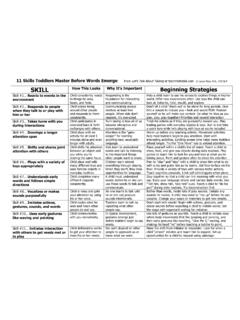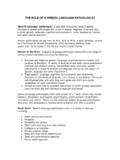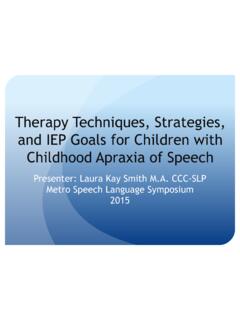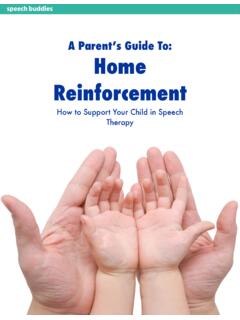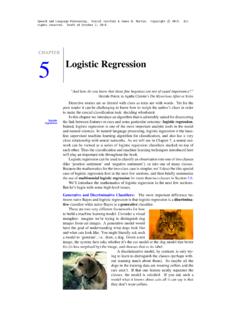Transcription of Laura Mize, M.S., CCC-SLP Pediatric Speech-Language ...
1 Laura Mize, , CCC-SLPP ediatric Speech-Language PathologistA Parent s Guide to UnderstandingSpeech- language Development in ToddlersLanguage development does not happen overnight. Laura Mize, , CCC-SLPI m going to give you an overview of how basic communication skills evolve so that you ll have a better understanding of this process and will be able to gauge how your child is doing. However, this material should not be a substitute for advice from a certified Speech-Language pathologist who can work individually with you and your child.
2 Table of ContentsIntroductionChapter 1 Interacting Chapter 2 UnderstandingChapter 3 Expressing Chapter 4 How a Child Sounds ConclusionCommunication Milestones ChartResources from process of developing language begins long before you hear a child s first word! Late I worry? No two children develop alike. Don t compare your child to someone else s child. For the most part, that s wise advice, but there is something important that you should There arepatterns of communication skills that babies and toddlers acquire within broader age ranges.
3 If skills are not emerging and developing within that time frame, we know that a toddler may have a Speech-Language delay or disorder. What s the risk? When communication delays are left untreated in early childhood, research tells us that the risk increases exponentially for future academic and learning issues. Learning to use and understand language is essential for nearly every other kind of learning your child needs -not only as a toddler, but as he gets older and enters preschool and one knows your own child like you are the EXPERT!
4 However, ,aswe retalkingaboutlanguagedevelopment, ,we llalsoreviewalistofredflagswhichshouldin dicatetoyou-innouncertainterms-ifthereis aproblemwithyourchild , play a key role in providing early intervention. This doesn t necessarily mean you ll see a professional right away. What it WILL mean is that, as a parent, you can change what you re doing at home to help your child. Early intervention works!CommunicationFour Important AreasEarly Speech-Language skills unfold in a predictable pattern and include how a child learns to: INTERACT with othersUNDERSTAND what words meanEXPRESS intentions with gestures or wordsPRODUCE speech sounds others can understandA problem in any one of these areas can result in Speech-Language delay or disorder.
5 Knowing what to pinpoint as the source of the problem determines how we work with a child and, ultimately, the progress he or she will make. To put it simply: If you re working on the wrong problem, you re likely to see little, slow, or no success. CHAPTER ONEHow A Child InteractsSocial InteractionBuilding the FoundationAll communication begins with interaction between two a child learns to: pay attention to people listen to what others say initiate contact with other people enjoy playing together and sharing s not ready to understand and use skills are the foundation for language .
6 Interacting is Connecting What We Want to SeeSeeking out and responding to other people is a skill we want to see develop in infancy. We want to see babies: enjoy watching other people particularly their faces. smile, laugh, and get excited when you talk to him by the time he s 6 months old. Even though they re busy by nature, toddlers with typically developing language skills are not difficult to engage. Toddlers should: include you in their activities. show you things. try to direct your attention to look at them. look back and forth between you and a toy as you play together.
7 Smile at you with frequent and easy eye your child is doing these things, her social skills are developing nicely and not a factor in late talking. Red Flags with Interacting Skills Difficultymakingandmaintainingeyecontact Doesn tuseeyegazetogetyourattention Seemstoignoreotherpeople Doesn tconsistentlyrespondtohisnameby12months Difficultygettingherattentionwhenyoutalk toher Doesn tlooktowhereyou repointingorwhenyousaytoher, Look! Demonstratesbetterattentiontoobjects,aDV DorTVshow,oranapporiPadthantopeopleandco nversations Noback-and-forthsharingofsounds,smiles,o rfacialexpressions Seemsveryindependentanddoesn tknowhowtoaskforhelpwhensheneedssomethin g MaynotinitiateorrespondtocuddlingIf a child exhibits several red flags with interaction skills, the issue is likely more serious than late talking.
8 What You Can DoTo Improve InteractionGet down on her level on the floor and really play together. Find things she likes to do with you and do them over and over. Encourage him to look at you and to share experiences with you. If he s playing with a toy or watching his favorite DVD, make sure you re included too! As you play together, you should also focus on helping him learn to copy or repeat what you do. Teach him to imitate you with toys or during little games that you know he s learning from you. Try "Patty Cake or Ring Around the Rosies.
9 Limit screen time. Research says toddlers who watch more than 2 hours a day with screens are at risk for delays. The worstthing you can do for a child who is struggling to learn language is to let her check out, do her own thing, or remain disconnected from others for much of the day. Sing! Play! Tickle! Run! Jump! Be silly! Have fun together!A child must learn to loveto stay with you and play with you before he can learn anything else from you!Did you notice my eyes in this picture? Make yourself interesting to look at so that a child will learn to include you as you play TWOHow A Child UnderstandsUnderstanding SkillsCognition and Receptive LanguageDuring the first year a baby learns to understand how the world around him works.
10 He learns about routines and when to expect things to happen in his day. She learns that objects don t disappear even though she can t see them (object permanence) and that she can make things happen (cause & effect). When a child becomes more skilled at moving his own body, he learns that he can get things and make things better for himself (simple problem solving). These kinds of milestones are cognitive or thinking and learning child s cognitive skills blossom into an amazing ability to understand what people are saying to him.

